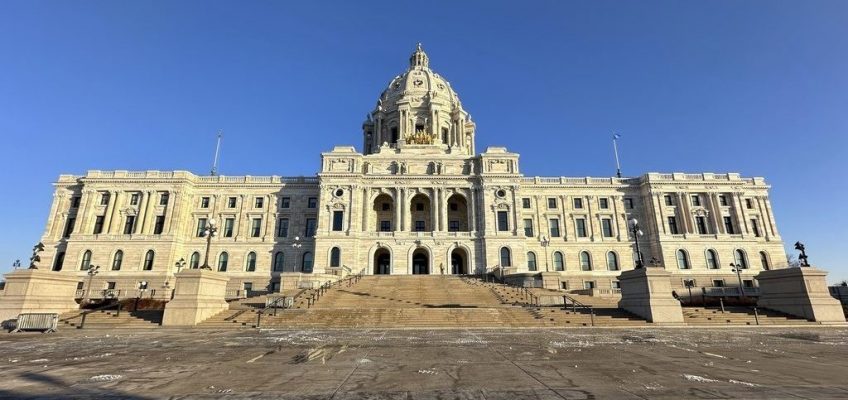A board of top state officials chaired by Gov. Tim Walz that oversees $155 billion of Minnesota’s retirement fund investments has repeatedly delayed meetings this year and held one virtually due to what they say are concerns about political violence.
Minnesota’s State Board of Investment, which manages investments for 800,000 members of three employee retirement systems in the state, typically holds quarterly meetings in person. Until a remote hearing on Tuesday this week, it had only held one so far in 2025.
Tuesday’s meeting had initially been scheduled in May but had been delayed multiple times — first to June 18, but was again postponed after the June 14 assassinations of former House Speaker Melissa Hortman and her husband Mark, and the shootings of Sen. John Hoffman and his wife, Yvette, according to board management and state Auditor Julie Blaha, one of the board’s four members.
The delays also come as a group of activists demanding that the state drop its investments in Israel continues to protest at meetings. Eleven protesters were arrested by the Minnesota State Patrol during a sit-in at the state Retirement Systems Building on Tuesday, not far from the state Capitol in St. Paul, as the board met virtually. All have been released, though they face trespassing charges.
Security concerns
When asked if the changes to meetings were tied to protests, state leaders and board management pointed to security concerns in the wake of the June assassinations.
“I agreed to meet virtually this month because, with the recent wave of political violence, we need to re-evaluate the security of our meetings,” Blaha said in a statement. “We must ensure we can protect not only those of us on the board, but also our staff and meeting attendees. In December, if security needs are met, I expect we’ll be back in person.”
Blaha, who sits on the board with the governor, Attorney General Keith Ellison, and Secretary of State Steve Simon, said she supports the First Amendment right to protest. Israeli divestment protesters had 30 minutes during Tuesday’s investment board meeting to offer public comments.
“I respect their voices and welcome their presence, even when we disagree,” Blaha said. “That’s why we allot time for public comment and why I meet with constituents regularly to discuss their concerns.”
Protesters
Divestment protesters say they’re frustrated by the delays and venue changes and have accused state leaders of postponing meetings and taking them online to avoid difficult conversations about Israel’s treatment of Palestinians.
Meredith Aby with the Anti-War Committee, a Minneapolis group that opposes U.S. aid to Israel and supports divestment, said she and other protesters were frustrated by date changes and were skeptical of SBI blaming political violence for delays.
“Between that (March) meeting and the meeting this time, it was moved to all virtual,” Aby said. “People just feel like they’re getting iced out of the process.”
When asked, board leadership didn’t say why the May meeting was delayed. The last time the State Investment Board met was in March at a building away from the state Capitol complex. Prior to that, the board had met in Senate hearing rooms — except from May 2020 to February 2022 during the worst of the COVID-19 pandemic.
Investments
Around $177.8 million of $155 billion in assets managed by the investment board are in Israeli holdings — around 0.11%. They are externally managed by independent third-party firms, according to the SBI. Protesters argue the state has billions more in companies that supply Israel with weapons and equipment.
In response to a request for comment on the protests and arrests, the governor’s office noted that even as meetings go online, the board allows comment periods.
“There is always an opportunity for public comment at these meetings,” said Claire Lancaster, a spokesperson for Walz. “However, protesters must be lawful and respect public property.”
Protesters claim the board rescheduled the Aug. 20 meeting after members learned of their intent to “pack the room.”
Jill Schurtz, executive director and chief investment officer for the board, said the delay in August was “in the aftermath” of the assassinations. Blaha, meanwhile, said it was to allow “more time to complete” an analysis for the state’s investment strategy.
Schurtz also said ”heavy construction” at the state Capitol complex has “made it more challenging to secure large public meeting space, particularly when the Minnesota Legislature is in session.”
Related Articles
Gun owners group says it’ll sue if St. Paul moves forward with firearms ordinance
MN Attorney General Keith Ellison to seek third term
Fighting fraud core issue for GOP gubernatorial candidate Kristin Robbins
Minnesota energy assistance delayed by federal shutdown
‘Everybody is frustrated’: ‘No Kings’ protests in St. Paul, across Minnesota draw thousands


Leave a Reply